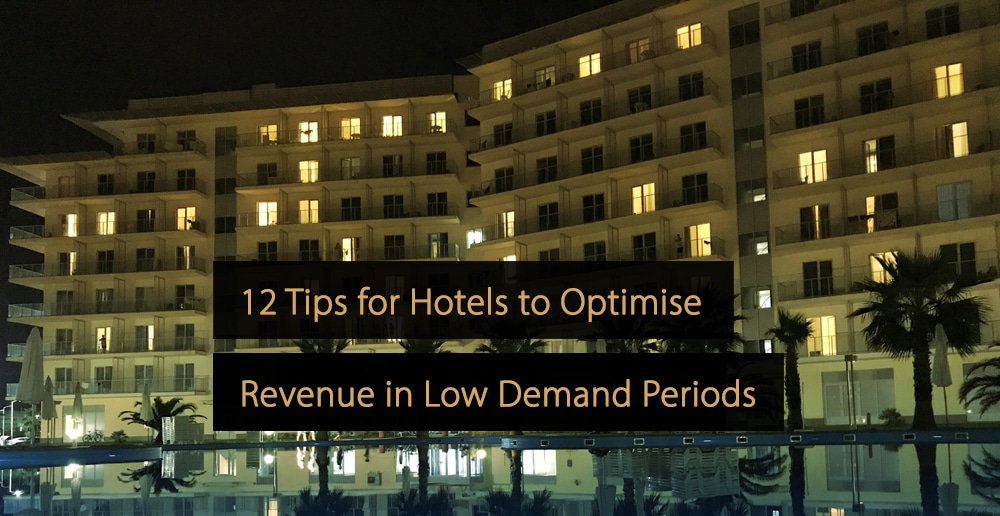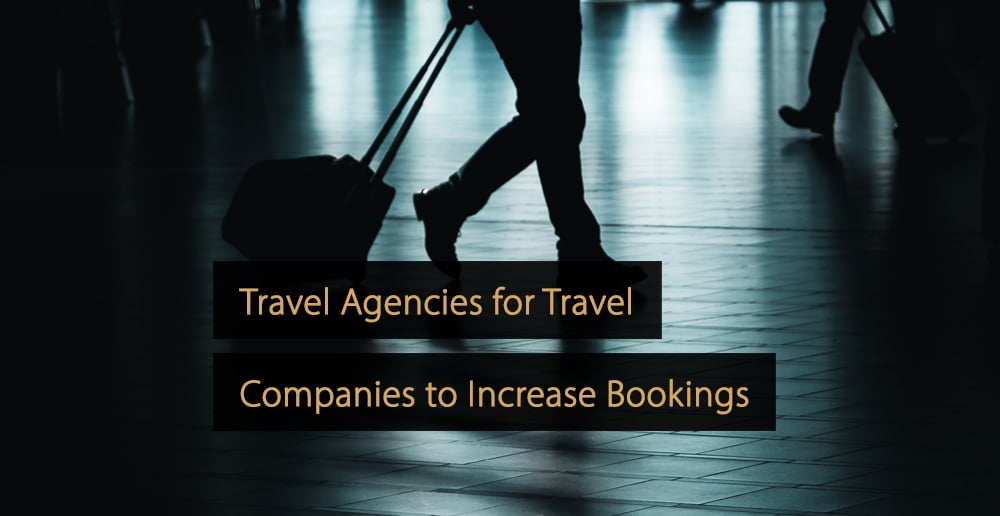For hotel owners, low season and other periods of low demand represent a major challenge, as fewer rooms being booked means less money coming in, and that can have serious cash flow repercussions. This is why it is so important to optimize revenue and ensure you are able to bring in as much money as possible from the guests you are able to attract. Here, you will find 12 tips to help you achieve this aim and maintain a healthy financial situation.
Table of Contents:
- Seasonal and Accidental Low Demand
- What Does a Low Demand Period Mean for Your Hotel?
- 12 Tips to Optimize Revenue in Low-Demand Periods
- 1. Anticipate Through Forecasting
- 2. Keep a Close Eye on Your Pricing Strategy
- 3. Optimize Your Distribution Channels
- 4. Optimize Your Advertising Strategy
- 5. Optimize Your Marketing Strategy
- 6. Use your Database to Address Specific (Loyal) Guests
- 7. Optimize Revenue With Up-Selling & Cross-Selling
- 8. Prioritize Your Hotel’s Local Proposition
- 9. Attract More Business Guests & Meetings
- 10. Work With Tour Operators
- 11. Organize Events to Boost Low Demand
- 12. Offer Packages That Fit the Needs of Your Target Group
- Tips for Hotels During the Corona (COVID-19) Crisis
- More Corona Tips to Prepare for Better Times
Seasonal and Accidental Low Demand
Within hotel and hospitality management, ‘low demand‘ refers to a period during which fewer people want to book rooms in your hotel. In other words, demand for your hotel rooms is lower than normal. In general, periods of low demand can be separated into two main categories, which are as follows:
1. Seasonal Low Demand
Seasonal low demand refers to low demand that occurs at particular times and is usually fairly predictable. For example, many leisure-orientated hotels experience higher demand during weekends and holidays but lower demand during the working week. With business-orientated hotels, the opposite applies, as mid-week demand is higher.
If you have a beach resort in Europe, you will anticipate high demand from June until August, but low demand from November until around March due to the weather, whereas ski resorts experience low seasons in the summer. Beach resorts in Australia would expect high demand from December to February, which are their summer months.
As low seasonal demand tends to be logical and follow the same patterns, it is easier to forecast and optimize revenue.
2. Accidental Low Demand
“Accidental” low demand is, by comparison, much harder to predict and occurs for various reasons, including economic and geo-political events and at times of crisis. For example, the financial crisis in 2008 had a global impact on travel and hospitality, as private individuals had less money to spend, and businesses had to contend with uncertainty.
The causes of accidental low demand can be global, national, or local. For instance, political instability in Turkey in 2016 greatly impacted Turkish resorts, as many tourists avoided visiting the country and opted to go elsewhere.
The coronavirus (COVID-19) pandemic has led to event cancellations and local businesses, like restaurants and bars, closing. And travel restrictions brought in by world governments are resulting in lower demand across the board.
Accidental low demand is extremely difficult to forecast, and the drop off in demand can be impossible to know, making hotel management and efforts to optimize revenue much more challenging.
What Does a Low-Demand Period Mean for Your Hotel?
Once you understand what low-demand periods are, it is important to consider what they actually mean for your hotel:
Lower Occupancy Rates
The most obvious consequence of a low-demand period is lower occupancy rates for your hotel. In other words, the percentage of your hotel rooms that are actually booked at any given time is likely to decline because fewer people are interested in visiting your hotel. This then results in less revenue coming in from room bookings and will likely mean less money being generated by other services within your hotel, too, such as your bar or restaurant.
Strong Competition
At times of high demand, hotels can thrive even with tough competition. After all, if enough people visit a location, a single hotel will not have enough room. However, this becomes a far greater challenge in low-demand periods, where the same competition exists. With fewer guests to compete for, rival hotels attracting guests away from your hotel and towards theirs can devastate your financial results.
Competitive Pricing
When demand falls, many within the hospitality industry will lower the price of their rooms to attract existing customers and lure customers away from rivals. Of course, if you and your rivals adopt this strategy, you can be engulfed in ongoing pricing competition. The main dangers here are being beaten on price by a rival or lowering your prices to a level where your hotel stops being profitable.
Note regarding the coronavirus (COVID-19) pandemic
The coronavirus (COVID-19) pandemic has hit the hotel industry hard, leading to hotels struggling with low demand and even temporary closings.
The duration of the drop-off in demand is hard to predict, which can make efforts to optimize revenue much more challenging than ever. The tips are not specifically written for low demand caused by COVID-19. But still can help hoteliers to optimize revenue. Some tips are directly applicable and can be used to prepare for better times.
If you have additional tips for (fellow) hoteliers, feel free to comment below this article.
12 Tips to Optimize Revenue in Low-Demand Periods
During your low-demand periods, it is absolutely imperative to optimize revenue, and the following 12 tips can help:
1. Anticipate Through Forecasting
Forecasting is a strategy that relies on historic performance data, wider industry data, and other information to predict future levels of demand. It is a crucial tool for any hotel looking to optimize revenue during periods of low demand because it allows you to anticipate these periods in advance and plan for them.
Accurate forecasting will consider market circumstances, bookings that have already been made, local events, performance information from rival hotels, and fluctuations in demand over previous years. With a revenue management system in place, you can even automate the forecasting process and always have up-to-date information.
Forecasting should be performed regularly, covering short-term and long-term periods. From there, you can make informed decisions about room rates, expenditure, and which demographics to target marketing efforts towards.
Find more detailed information about forecasting in the article “Forecasting Tips to Improve Your Revenue Management Strategy”.
2. Keep a Close Eye on Your Pricing Strategy
When demand for your hotel rooms is low, your pricing strategy can be critical. Charging lower room rates could help attract price-sensitive customers, who may choose your hotel over a competitor, resulting in incremental revenue. However, low prices can be detrimental during certain low-demand periods too.
For instance, if demand is very low, reducing the room rate may not work to attract any new customers, and all it will result in is the few guests who wanted to book anyway paying a lower rate, resulting in less revenue. Moreover, reducing prices too much can damage the value perception of your hotel and its services.
Therefore, you need to use the right pricing strategy for the right moment. You can learn more about pricing strategies within the hotel industry from our “Pricing Strategies to Increase Your Hotel Revenue” article.
3. Optimize Your Distribution Channels
During low-demand periods, you must make your hotel as easy to find as possible so you do not miss out on the customers who want to book a room. Review your distribution mix and ensure your hotel is available on all relevant channels, including online travel agents (OTAs), hotel metasearch engines, and global distribution systems.
If there are gaps in your distribution mix, expand it with new, relevant channels and markets to help to compensate for lower demand. Meanwhile, you also need to consider convincing guests to book a room in your hotel instead of a rival. Upload great pictures, write a captivating hotel description, and clarify your unique selling points.
When it comes to working with OTAs, pay attention to any promotions they have available too. Some OTAs will allow you to pay for higher placement on their search engines or ad campaigns targeting key demographics.
Find more detailed information about distribution management in the article “Tips To Increase Your Hotel Bookings Through OTAs“.
4. Optimize Your Advertising Strategy
It is never enough to hope customers will find your hotel, but this is especially true in periods of low demand, which is why it is so vital that you have an advertising strategy in place. Your ads can take many forms, from Google hotel ads to social media advertising and promotional opportunities on OTA platforms.
It may also seem counterintuitive to invest at a point when revenue is slow, but this is why you need to be tactical. The goal is to increase high-quality traffic by attracting your target demographics – those most likely to book in the low season. While rivals cut their ad budgets, the strategic investment could make a huge difference.
Once your advertisements are up and running, you also need to monitor the ROI for each type of ad closely. If the ROI is too low, it may be because demand is too low, even with the advertisement, or that particular advertisement type is not working. Optimize your strategy as you go and allocate your budget to the types that produce an ROI.
Find more detailed information about advertising strategies in the article “Effective Hotel Advertising Strategies”.
5. Optimize Your Marketing Strategy
Furthermore, you also need to optimize your marketing message. Be clear on why a potential guest should choose your hotel over a competitor and consider the unique selling points, whether that includes the location, style of the hotel, level of service, level of comfort, facilities, or even things to do in the local area.
You can address different target groups with a different USP or message. For instance, a business traveler may want excellent Wi-Fi and in-room facilities, while a leisure guest may be more interested in fine dining, spa facilities, or local tourist sites. One tip is creating different landing pages on your website for these target groups.
Find more detailed information about marketing strategies in the article “Essential Hotel Marketing Strategies“.
6. Use your Database to Address Specific (Loyal) Guests
Another important strategy to optimize revenue in low season is to look into the data available to you via your property management system and target specific, loyal guests with a certain need or specific characteristics. The needs and characteristics you target will depend on your hotel, its location, and the reason for low demand.
If you experience low demand in the middle of the week, for instance, you might target previous guests who are retirees with a passion for hiking. If you struggle to fill rooms at the weekend, why not offer regular mid-week business guests a discount so they can extend their stay to cover the weekend too?
You could also reach out to guests who stayed at your hotel during the same period in a previous year or offer attractive spa deals for previous spa guests. The benefit of this is the ability to reach a key target audience with whom you already have some level of a relationship without adding to your advertising costs.
7. Optimize Revenue With Up-Selling & Cross-Selling
When room demand is low, you need to maximize the amount of money you take from each guest to optimize revenue. The best way to succeed in this task is to capitalize on any up-selling and cross-selling opportunities that come your way, and these opportunities start from the moment a guest starts to book with your hotel.
Up-selling is the practice of encouraging a customer to spend more on their current purchase. With hotels, this could mean persuading them to pay more for a larger room, a better bed, or a room with a better view. Cross-selling, meanwhile, encourages additional purchases, which could mean tours or spa services.
The low season may make it difficult to increase the volume of bookings, but up-selling and cross-selling can help you to increase the revenue generated from existing guests, which can help to make up the shortfall.
Find more detailed information about upselling strategies in the article “How Much Revenue Could Your Hotel Make From Upselling?”.
8. Prioritize Your Hotel’s Local Proposition
As previously stated, some periods of low demand can impact a whole country or region, making the rest of the world less likely to want to travel there. The causes may be seasonal, political, or based on other factors, but the damage can be reduced if you make your hotel not solely dependent on international travelers.
To do so, you must prioritize your local proposition and ensure you offer something to people nearby. For business guests, this could be excellent facilities, such as conference rooms or function rooms, while for leisure guests, it might mean having an amazing restaurant, bar, gym, spa, or sports facilities. Due to the COVID-19 crisis, many hotels and restaurants are closed for a certain period but can still deliver food at home. Therefore, a few choose to generate additional revenue by partnering up with services like Uber Eats and Deliveroo.
Promote these facilities to customers in your area, and you may also benefit from repeat local visits.
9. Attract More Business Guests & Meetings
When demand is low among leisure travelers, some of the shortfalls may be able to be made up by attracting more corporate travelers and business meetings or functions. Corporate travel is a continuously growing market, and business travelers are a useful demographic to attract because they often return to the same areas multiple times.
The rise of ‘bleisure’ – where business travelers extend trips for leisure purposes – means business travelers are also becoming even more valuable. Moreover, many business travels take place regardless of factors like the weather. Loyalty programs, fast internet access, and corporate amenities can all help to attract these guests.
In our article “Tips to Attract More Corporate Travellers to Your Hotel”, you will be able to learn more about the importance of generating bookings from corporate travelers, along with some of the best tactics for doing so.
10. Work With Tour Operators
Tour operators sell package holidays and other package travel products, making booking easier for customers. For hotels, working with tour operators provides a unique opportunity to optimize revenue in low-demand periods, as these operators tend to be able to attract specific kinds of guests.
For instance, if your hotel is located in a city, tour operators will specialize in organizing city breaks. The key to success when working with tour operators is good forecasting, identifying the right tour operators to work with, and understanding what they can provide for your hotel.
Tour operators sell a package deal, including flights and accommodation, but the hotel rate is typically lower than you usually sell for. However, what tour operators can provide is a volume of guests, and this can be especially beneficial at times when many of your rooms would otherwise be left vacant.
11. Organize Events to Boost Low Demand
During periods of low demand, some guests may still be able to be attracted to a hotel if they have a specific reason for going there. With this in mind, some hoteliers and chains have successfully organized in-house events during the low season to attract incremental bookings and bring in extra revenue.
Examples include organizing events with well-known performers, artists, or businesses. These might include stand-up comedy shows, concerts, theatrical performances, exhibitions, or club nights. In this context, the hotel room becomes convenient for anyone attending the event, especially those who have traveled a long way.
The big advantage of this approach is that you can advertise to and attract a target audience with a specific interest (i.e., the event). If you do not have experience putting on events, you can also work with an event organizer.
12. Offer Packages That Fit the Needs of Your Target Group
Finally, once you have useful data explaining why you are experiencing low demand and a reliable forecasting model, you can use the information available to you to identify a clear target group to focus your efforts. With this target group identified, appealing to them through packages becomes much easier.
These package deals may consist of multiple-night stays, dinners included in the room price, concert tickets, local tours, or entrance to a local museum. You could create a “couples” package, which includes spa treatments, or your target group may share a common interest, like cycling, where you can offer equipment.
Be clear on the target group, design a special package for them, and aim your promotional efforts toward them.
Tips for Hotels During the Corona (COVID-19) Crisis
The Corona (COVID-19) virus global pandemic is an unprecedented crisis, and hotels are among the many businesses feeling the effects, as global travel restrictions come into force and entire countries face ‘lockdown’ procedures. In the article “Tips for Hotels During the Corona (COVID-19) Crisis,” you will find tips to optimize revenue and limit the damage during the Corona crisis.
More Tips to Prepare for Better Times
The coronavirus pandemic (COVID-19) crisis has hit the hospitality and travel industry hard. Due to (partial) lockdowns, travel restrictions, and social distancing, business events and holiday trips are postponed or canceled, resulting in a decline in business.
In the category “Corona,” you find tips that help businesses operating in the hospitality and travel industry recover and prepare for better times.
Low demand periods are inevitable in running a hotel, but there are ways to offset the damage. Using the 12 tips to optimize your revenue, you can ensure your hotel remains successful all year round.
More Tips to Grow Your Business
Revfine.com is the leading knowledge platform for the hospitality and travel industry. Professionals use our insights, strategies, and actionable tips to get inspired, optimize revenue, innovate processes, and improve customer experience.Explore expert advice on management, marketing, revenue management, operations, software, and technology in our dedicated Hotel, Hospitality, and Travel & Tourism categories.








Hi Revfine, I real appreciate your article. There are many important tips that any sales, marketing and CX expert could use and take advantages of.
I look forward to receiving more tips from you. Yours sincerely.